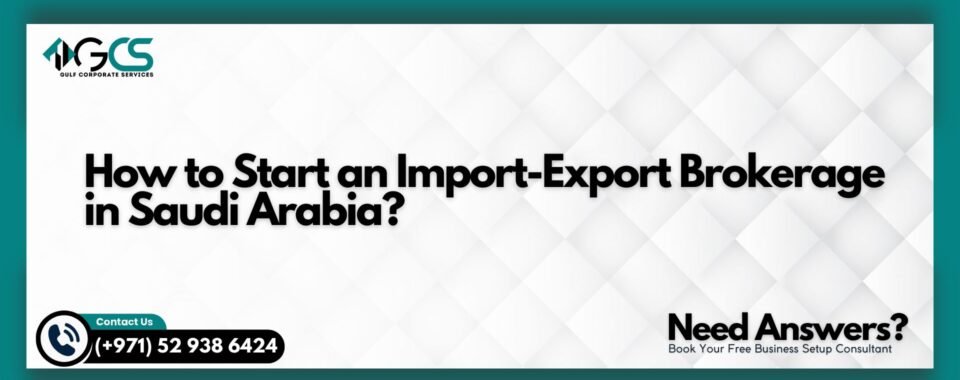
The Kingdom of Saudi Arabia is one of the largest trade hubs in the Middle East. With billions in imports and exports passing through its borders every year, it’s no surprise that setting up an Import-Export Brokerage in Saudi Arabia is a smart business move.
From electronics and building materials to agricultural products and machinery, Saudi’s ports and customs zones are buzzing with activity. The country’s location, infrastructure, and economic policies create the perfect environment for brokerage services. If you’re thinking about tapping into this sector, now is the right time.
This guide will walk you through the full process—from legal requirements to setting up your office—so you can launch your import-export brokerage with confidence.
What is an Import-Export Brokerage?
An import-export brokerage is a service business that helps buyers and sellers move goods across international borders. You act as the middleman—facilitating transactions, coordinating logistics, managing paperwork, and ensuring compliance with local customs rules.
Your clients could be Saudi companies looking to buy from abroad, international suppliers wanting to enter the Saudi market, or even small businesses needing support with customs clearance.
Why Start an Import-Export Brokerage in Saudi Arabia?
There are several reasons why this business model thrives in the Kingdom:
Strategic Location
Saudi Arabia links Asia, Europe, and Africa, making it a key transit point for goods. The Red Sea and Arabian Gulf provide access to major global shipping routes.
Economic Growth
As the country continues to diversify its economy under Vision 2030, international trade volumes are growing. That means more opportunity for brokers to support deals and supply chains.
Demand for Expertise
With constantly evolving import/export regulations, many businesses prefer to work with brokers who know how to navigate customs, licenses, and logistics efficiently.
Low Overhead Model
Unlike owning inventory or running a warehouse, an import-export broker can operate with a small team, smart tech tools, and strong networks.
Step-by-Step Guide to Start an Import-Export Brokerage in Saudi Arabia
Let’s break down how to launch your brokerage business in simple, practical steps.
Step 1 – Define Your Niche and Services
You don’t need to handle every product under the sun. Focus helps. Choose a niche like:
- Food and beverages
- Electronics
- Construction materials
- Fashion and apparel
- Health and wellness products
Also, decide what services you’ll offer:
- Freight coordination
- Customs clearance
- Product sourcing
- Trade documentation
- Market entry consulting
Being specific builds trust and makes your marketing more effective.
Step 2 – Create a Business Plan
Your business plan is your roadmap. Include:
- Target market and services
- Competitive analysis
- Pricing model
- Marketing strategy
- Financial projections
- Setup and staffing needs
This will help when applying for your Import Export license in Saudi Arabia and for securing investors or partners.
Step 3 – Choose Your Legal Structure
Decide whether you’ll register as a:
- Limited Liability Company (LLC) – Best for foreign investors or joint ventures
- Sole Establishment – For Saudi nationals or GCC citizens
- Branch of a foreign company – If you already operate outside Saudi Arabia
Each has different setup procedures and capital requirements.
Step 4 – Register Your Business
You’ll need to go through the following steps:
- Reserve your business name
- Apply for a commercial registration (CR) with the Ministry of Commerce
- Obtain your Import Export license in Saudi Arabia from the relevant authority—usually the Ministry of Investment (MISA)
- Register with ZATCA for tax and VAT
- Join the Chamber of Commerce in your city
Make sure all documents are clear, translated (if needed), and properly notarized.
Step 5 – Secure a Commercial Office Address
A physical office address is required to register your company. Depending on your budget, you can choose:
- Serviced offices
- Business centers
- Shared coworking spaces
If you plan to expand into freight handling, you might also need a warehouse address later on.
Step 6 – Build Your Supplier and Client Network
An import-export brokerage is all about relationships. Start building your database of:
- Global suppliers (especially in China, Turkey, India, and Europe)
- Local distributors and retailers in Saudi
- Freight forwarders and customs clearance agents
- Government contacts and port authorities
Use trade fairs, B2B platforms, and LinkedIn to connect.
Step 7 – Understand Customs Procedures and Regulations
Customs in Saudi Arabia is managed by ZATCA. You’ll need to understand:
- Harmonized codes (HS codes)
- Import restrictions or banned items
- Product labeling requirements
- Duties and taxes
- Required certifications (SASO, SFDA, etc.)
Mistakes can delay shipments, cost clients money, or even result in fines. Accuracy is key.
Step 8 – Hire a Skilled Team
Depending on your scale, you may need:
- A logistics coordinator
- A document specialist
- A customs clearance expert
- A sales or client service manager
- A bilingual admin assistant
Even if you start solo, plan to expand as your business grows.
Step 9 – Launch a Website and Branding
You’ll need a professional digital presence to build trust. Your website should include:
- Services and pricing
- Industries you specialize in
- Client testimonials
- Contact and inquiry form
- Trade tips and blog (great for SEO)
Don’t forget to create business profiles on Google, LinkedIn, and trade directories.
Step 10 – Start Marketing and Outreach
Use a mix of:
- LinkedIn outreach to manufacturers and exporters
- Local ads targeting importers in Saudi
- Google Ads or SEO targeting “import agents in Saudi Arabia”
- Participation in exhibitions like Saudi Build, Foodex, or Global Sources
Networking is essential—this business grows through referrals and industry reputation.
Estimated Costs of Starting an Import-Export Brokerage
Here’s a basic cost outline:
| Expense | Estimated Range (SAR) |
| Business registration & licenses | 10,000 – 20,000 |
| Office rental | 15,000 – 40,000 annually |
| Website & branding | 5,000 – 10,000 |
| Legal & consultation fees | 5,000 – 15,000 |
| Staff salaries | Based on team size |
| Marketing & events | 5,000 – 25,000 |
This business can start small and scale big based on client demand.
Benefits of Starting an Import-Export Brokerage in Saudi Arabia
Starting an Import-Export Brokerage in Saudi Arabia comes with several advantages:
- Low startup costs compared to trading companies
- No need to own inventory or warehouses
- High revenue potential through service commissions
- Endless industry diversity—work with any product category
- Growing demand for trade expertise due to regulation complexity
It’s a great way to enter the Saudi market with flexibility and low risk.
Compliance and Long-Term Success
To run a long-term business:
- Stay up to date with import-export regulations
- Renew your commercial registration and licenses on time
- Keep digital records of all transactions and clearances
- Offer ethical, transparent services to build client trust
- Reinvest in tech tools to automate tracking and updates
If you plan to grow, consider expanding into freight forwarding or offering warehousing partnerships.
Conclusion
Starting an Import-Export Brokerage in Saudi Arabia is a smart and sustainable business idea—especially with the Kingdom’s strong trade ties, global partnerships, and growing need for intermediaries. Whether you’re helping local businesses source goods or assisting foreign brands enter the Saudi market, your role is valuable and in demand.
Get your Import Export Business in Saudi Arabia up and running with proper planning, the right licensing, and a clear understanding of the logistics game. With trust, efficiency, and strong networks, your brokerage can become a key player in the country’s trade ecosystem.








